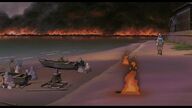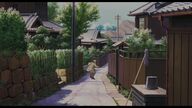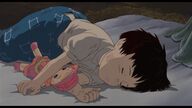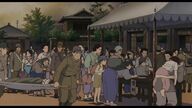Regarding "Grave of Fireflies", there has been constant controversy on the Chinese Internet, and the focus is nothing more than the boring theme of "Is this an anti-war film or an anti-war defeat film". In fact, the theme of the film is arguably irrelevant to either. I think one of the fundamental reasons for this chaos is that many people understand this Takahata movie as Hayao Miyazaki's work .
As the two giants of Ghibli and half of the "masters" of Hayao Miyazaki's animation, Takahata and Hayao Miyazaki have certain similarities in terms of work style, performance techniques and story characteristics, so many audiences can't help but use interpretation. Miyazaki's work to understand Takahata - or even confuse the two at all. But in fact, there is a fundamental difference between Takahata and Miyazaki's works. If you look at Takahata in the same way as Miyazaki, it will inevitably lead to huge misunderstandings.
The difference between the two lies in their attitude towards the protagonist.
Hayao Miyazaki's attitude towards his protagonists is absolutely positive . The protagonists in his works are basically the embodiment of his ideal personality, and he absolutely supports and agrees with the protagonists in his works. Even if the protagonists of some works are immature at the beginning (such as "The Witch 's Delivery Service " and "Spirited Away"), they will definitely grow into brave and beautiful ideal characters in the middle and later stages. Even in the "adult style" work of " Princess Mononoke ", where several forces are not completely just, there is also a completely just protagonist , Asidaka , who acts as a neutral mediator between various forces.
But Takahata is not like this. He has a much more ambiguous attitude towards the protagonists of his works. For this, everyone regards Takahata's middle and late works ("The Cellist", "The Tomb of the Fireflies", "The Fairy Tale of Time", "The Ever- changing Civet Cat ", "I" "Neighbor Yamada-kun" and "The Story of Kaguya Princess "), you can feel it after reading it once - Takahata doesn't fully agree with the protagonist in his work . Aside from "Grave of the Fireflies", let's take a look at "Variety Civet Cat". There is a plot in which the civet cat killed a few human drivers who were just passing by by digging traps to intimidate humans not to approach the place where they lived—— The protagonist civet cats will kill people in order to protect their habitat , and they kill innocent people. Takahata obviously does not agree with the behavior of civet cats. Later, when the "civet cat monk" proposed a moment of silence for these innocent dead, the civet cats responded with laughter. .
You will never see similar plots in Hayao Miyazaki movies, there are also protagonists ( Nausicaa , Ashitaka) who can kill in Miyazaki movies, but only for self-defense or to protect others, absolutely not There is a scene where the protagonist kills innocents for a certain purpose ("Nausicaa of the Nausicaa" comic version is really crazy in the later period, but that is a comic. And even the crazy Nausicaa , Miyazaki still agrees and supports her).
There is also "The Story of Kaguya Princess". At the end, Kaguya made a generous statement to the god who came to pick her up a second before saying that there are many beautiful things in the world to be remembered. Oh, and Hayao Miyazaki would never shoot a scene where he directly slaps the protagonist in the face.
This is related to Takahata's creative concept. In September 2014, the first issue of " Southern Weekend " published an exclusive interview with him, in which Takahata talked about the biggest difference between himself and Miyazaki - Hayao Miyazaki hopes that the audience can sink into his films, while Takahata is I hope my film and the audience keep a certain distance. Compared with Hayao Miyazaki, Takahata wants the audience to be a bystander, enjoying the whole movie with an attitude of "appreciation", rather than substituting himself into a certain protagonist. He doesn't want the audience to "identify" with the protagonist, but only wants the audience to "understand" them. For this reason, he even deliberately designed certain bridges to make the audience "play". If an audience tells Takahata, I cried watching a certain work of yours, and I can empathize with the protagonist too much, he will most likely not be happy, but will be very embarrassed (this is also estimated that his movie box office is not as good as Miyazaki Hayao) an important reason).
Finally, when it comes to "Grave of the Fireflies", it is obvious that Takahata does not agree with the protagonist Seita, and even what he really wants to express is not the cruelty of war at all. What Takahata really wants to express is actually a society that has lost benevolence, and how its selfishness and indifference killed two children , this is what Takahata said clearly in the script outline of "Grave of the Fireflies".
Pay attention to the meaning of Takahata here - as a teenager of thirteen or fourteen years old, it is not easy for Seita to achieve this level. There are not many boys of his age who can support his sister alone in that social environment. long time. Seita and his sister both died in the end, mainly because of social problems rather than Seita's problems (but Takahata did not shy away from Seita there are definitely many problems, as he said before, understanding, but not agreeing).
Therefore, at the beginning of the movie, Takahata arranged such a scene - at the station, facing the dying male protagonist, passers-by just thought that he was humiliating to Japan:
In the film, there is also a lot of sarcasm against the Japanese government and "patriots". For example, the relative of Qingtai's boarding house, who talks about patriotism every day but is selfish everywhere, is a typical "mockery" - the suggestion that relatives are good people. Look carefully again, first of all, she is not supporting Qingtai for nothing And Setsuko, the rice that was exchanged for Seita's mother's kimono in front of her, she and Seita shared half and half.
After realizing that Qingtai's father was probably dead in battle (there was no response to Qingtai's letter to her father for a long time), she began to target everywhere, completely deliberately provoking Qingtai's emotions to drive him away, including but not limited to: when serving meals, only give Seita and Setsuko served rice soup, and directly said that they would not cook for Seita and Setsuko in the future. They offered to suggest that Seita and Setsuko live in the bomb shelter, and deliberately told Setsuko the news of her mother's death, which made Setsuko cry at night. Come over and blame Seita for not taking good care of Setsuko.
Finally, I would like to add that there are many people in the comment area who think that the relatives and aunts are good people, saying that she only eats grain porridge herself, and she eats white rice for her husband and daughter because they have serious work and school, and their physical exertion is relatively large. And she also helped Qingta wash the dishes.
Then first, let's see how the porridge she served to herself is different from the one she served to the Qing Taijiezi.
Then let's talk about her helping Seita wash the dishes. On the day she helped Seita wash the dishes, Setsuko, who had been in a stable mood before, suddenly cried and called her mother for no reason. Apparently, it was on that day that the relatives aunt told Setsuko that her mother had died, and Seita had asked her relatives not to tell her before. She helped Qingta wash the dishes to make up for her guilt.
Adults know forbearance. Only thirteen or fourteen years old, Qing Tai, who was still a young master before , couldn't help but feel excusable.
There is also a less straightforward "innuendo" - the ration station as the representative of the "Japanese government", the two appearances are like this:
When her sister was alive, Qing Tai went to get rice for her sister, but she could only get a little bit, and the staff didn't bother to say a word to him. When his sister died, Qingtai went to get charcoal to burn her sister, and the ration station generously gave a large box. The staff also smiled and taught him how to burn the body clean-the meaning of which is needless to say.
And the most obvious place, at the beginning of the plot of the bomber killing their mother, was taken by Takahata in a few scenes. This plot is to make the two children lose their family asylum and directly face the indifferent Japanese society. If Takahata really wants to "anti-war defeat" and shoot us Japanese so miserable, the bombing of the US military is too overly and inhumane, then why didn't you focus on portraying how beautiful, gentle, kind, innocent their mother was at the beginning, and she was killed by the Americans in a snap , doesn't this taste much right? But Takahata never even showed a mother's face from beginning to end. As for Qingtai and his sister, who focused on portraying, were they killed by a US bomber? No , the bomber didn't hurt them in the slightest, and even if there was no chaos caused by the US bombing so that Qingtai could rob and steal things, he and his sister would starve to death earlier. When the US plane came later, Qingtai couldn't be more happy. . Think carefully about what exactly is the director trying to express here? Could it be Takahata who said, "Our Japan was bombed by the United States so miserably"?
And the most ironic point - until her sister was about to die, Seita's savings actually had 3,000 yen left. You must know that their family account has a total of 7,000 yuan, which is almost half of the remaining money.
Before that, Qingtai was begging the farmer for credit, stealing things, even risking her life to steal during the bombing, and starving herself and her sister to severe malnutrition. ——Because he has been brainwashed by the propaganda machine of Japanese militarism, he feels that Japan cannot admit defeat, and the war will be fought for a long time, at least for several years, so in order to prepare for the future, he spends money on it. It wasn't until I heard people in the bank chatting when I was withdrawing money that I knew that Japan had long raised the white flag.
A thousand words come down to one point. If you feel that something is wrong when you watch "Grave of the Fireflies", it means that you are watching it right, because the protagonist of Takahata's movie is not for you to bring yourself in, but for you to watch from the sidelines. of. If you feel that you don't agree with some of Seita's words and deeds, or think that he is so miserable and deserves it, it is actually arranged by Takahata. He only hopes that you can "understand" the protagonist rather than "approve" the protagonist. If the audience follows the habit of watching Hayao Miyazaki's films and thinks that they should be fully involved in the protagonist, and that the protagonist is a just and innocent party from beginning to end, and that what the protagonist says is what the director wants to tell the audience, then what do you think of Takahata's films? Comprehension is bound to go a thousand miles away. On the basis of this misunderstanding, it is not surprising that "Grave of the Fireflies" is just anti-war defeat.
View more about Grave of the Fireflies reviews








